Navigating the health food section can be perplexing, especially when deciding between BCAAs vs Whey Protein for your supplement needs. Understanding the benefits and differences between BCAA supplements and whey protein powder is crucial, extending far beyond just bodybuilding and muscle recovery.
As a holistic nutrition specialist, I've spent years studying and working with clients to unravel the intricacies of these dietary supplements. This guide will simplify the complexities, helping you select the best option that aligns with your fitness goals and overall wellness.
The short answer is: Many people use BCAAs before a workout to help protect the muscles and improve endurance during a workout and use whey protein immediately after for muscle recovery. Read on, the learn why.
BCAAs and whey protein supplements each offer unique advantages for muscle growth, muscle building, and post-workout recovery. Whether your primary goal is weight loss, muscle repair, or enhancing athletic performance, it's essential to understand the chemical structure, benefits, and roles of these supplements.
The human body requires adequate protein for optimal health, and choosing the right protein source is vital for your daily protein intake.
However, not all supplements are created equal. Many brands include ingredients that may hinder healing and well-being. This guide emphasizes the importance of selecting high-quality protein options, free from preservatives, artificial flavors, colors, or sweeteners.
Whole foods, whole proteins, and natural ingredients are paramount for ensuring that your body absorbs the most important amino acids and the right nutrients without unnecessary additives.
It is fundamental to understand the key difference between BCAAs and whey protein powder, including their impact on the immune system, muscle recovery, and overall fitness goals.
This article is for informational purposes only. It is not intended as a replacement for professional medical advice. It is always recommended to consult with a personal medical doctor, naturopath, and/or dietician to adopt a plan for your unique health and wellness needs.
Jump to:
What are BCAAs?
Branched-chain amino acids (BCAAs) are pivotal in the world of fitness and nutrition, known as the building blocks of protein. But what exactly does BCAA stand for, and what roles do these compounds play in our bodies? BCAAs are a group of three essential amino acids: leucine, isoleucine, and valine. Unlike non-essential amino acids, the body cannot produce these, making their intake through food or supplements crucial.

The Functions of Individual BCAAs
- Leucine: This is the most potent of the BCAAs for muscle protein synthesis. Approximately 3-4 grams of leucine, is necessary to stimulate this process effectively.
- Isoleucine: Known for its role in muscle metabolism and is heavily concentrated in muscle tissue. It is also helpful in producing red blood cells, producing blood sugar, and promoting endurance.
- Valine: Plays a part in stimulating muscle regeneration and overall recovery, while boosting the immune system.
Benefits of BCAA Supplements
BCAA supplements have garnered attention for their significant role in muscle protein synthesis and recovery. They contribute to lean muscle mass by reducing muscle breakdown and mitigating muscle damage that occurs during resistance training. For athletes and fitness enthusiasts, this means improved recovery times and enhanced athletic performance.
Muscle Protein Synthesis and BCAAs
Muscle protein synthesis is the process by which the body rebuilds muscle fibres, essential for muscle growth and repair. Studies highlight the importance of BCAAs in this process. One study revealed that a drink containing 5.6 grams of BCAAs post-resistance workout led to a 22 percent greater increase in muscle protein synthesis compared to a placebo. Leucine, in particular, plays a pivotal role, being the key trigger for this process.
Natural Sources of BCAAs
BCAAs are found in protein-rich foods, making them accessible through a balanced diet. Natural food sources include:
- Meat and poultry
- Fish
- Eggs
- Dairy products
- Legumes and beans
- Nuts and seeds
These whole foods provide not just individual amino acids but also a spectrum of necessary nutrients, contributing to overall health.
BCAAs Beyond Muscle Training
While BCAAs are vital for muscle recovery, they also serve other purposes. They can be utilized for energy production during workouts and are known to reduce muscle soreness following exercise. However, it's important to note that while they aid in recovery and energy, BCAAs alone do not contribute directly to muscle growth.
In conclusion, BCAAs, available in powder form or through various food sources, are crucial for maintaining skeletal muscle health. They offer a range of benefits from supporting muscle cells during intense workouts to playing a key role in the process of muscle protein synthesis. Understanding the balance of enough protein intake, including the right grams of BCAAs, is essential for anyone looking to optimize their fitness and health regime.
What is Whey Protein?
In the realm of nutrition and fitness, whey protein stands out as a highly effective supplement. But what exactly is whey protein, and why is it so important for our health?
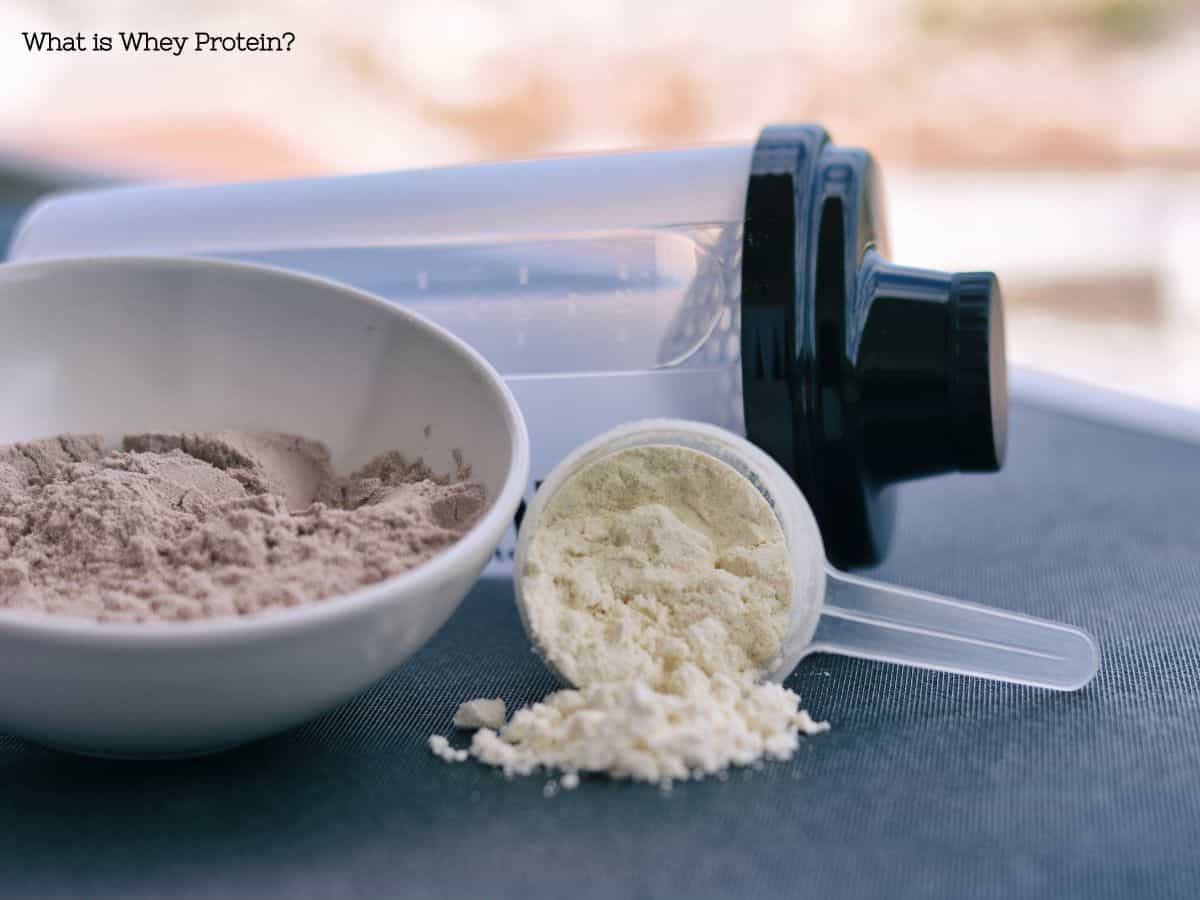
Whey protein is a byproduct of cheese production, separated from milk. It's renowned for its high-quality protein content, containing all essential amino acids needed by the human body. These amino acids are the raw materials for building new muscle tissue and aiding various bodily functions.
The Complete Protein
Whey protein is categorized as a complete protein, meaning it includes all nine essential amino acids necessary for human dietary needs. These amino acids are 'essential' because the body cannot produce them on its own, and they must be obtained through diet. Non-essential amino acids, although important, are naturally produced by the body.
Benefits of Whey Protein
- Muscle Building: Whey protein is pivotal in the world of bodybuilding and strength training. It provides the necessary amino acids for muscle gains and assists in the repair and growth of muscle fibres.
- Immune System Support: Rich in immunoglobulins, whey protein bolsters the immune system.
- Overall Health: Whey protein can contribute to general health improvements, providing a high amount of protein with relatively few calories.
Types of Whey Protein
Whey Concentrate: Contains a lower percentage of protein and more lactose and fat. It's a good balance of cost and nutrition.
Whey Isolate: Higher in protein content, lower in lactose and fat. Ideal for those with lactose intolerance.
Whey Hydrolysates: Pre-digested, faster absorption. Often used in medical protein supplements and infant formulas.
From a holistic nutrition standpoint, the cleanest form of protein is whole food and natural sources. Each of these types of whey protein undergoes processing and many companies take shortcuts that can, over time, compromise our health.
Of the three types of whey powder, whey concentrate is the least processed version. However, it is always important to check ingredients on the label and opt for the shortest list.
Grass-fed organic whey is best to ensure the highest quality milk is used. Taking it a step further, raw milk is even better!
Whey Protein in Diet
Natural food sources rich in whey protein include dairy products like grass-fed milk, cheese, and yogurt. For those who prefer plant-based proteins, there are vegan protein options derived from sources like peas, rice, and hemp.
While these plant-based proteins are beneficial, especially for those on a plant-based diet, they may lack one or more of the essential amino acids found in animal proteins like whey.
Absorption and Timing
Whey protein is known for its rapid absorption rate, making it a 'fast protein'. This means it is metabolized quickly by the body, providing a swift supply of amino acids to muscle tissues.
This characteristic makes timing important; whey protein shakes post-strength training can optimize the rate of muscle protein synthesis, leading to better muscle recovery and growth.
Choosing the Right Supplements
When considering whey protein supplements, it's crucial to focus on quality. Look for products with minimal additives and a high grams of protein count.
The right supplements should align with your nutritional needs and fitness goals, whether it's for building muscle mass, weight management, or overall wellness.
Amino Acids in Whey Protein
Whey protein is enriched with a variety of amino acids, each contributing uniquely to health and fitness. Understanding these amino acids can help you appreciate the full range of benefits whey protein offers:
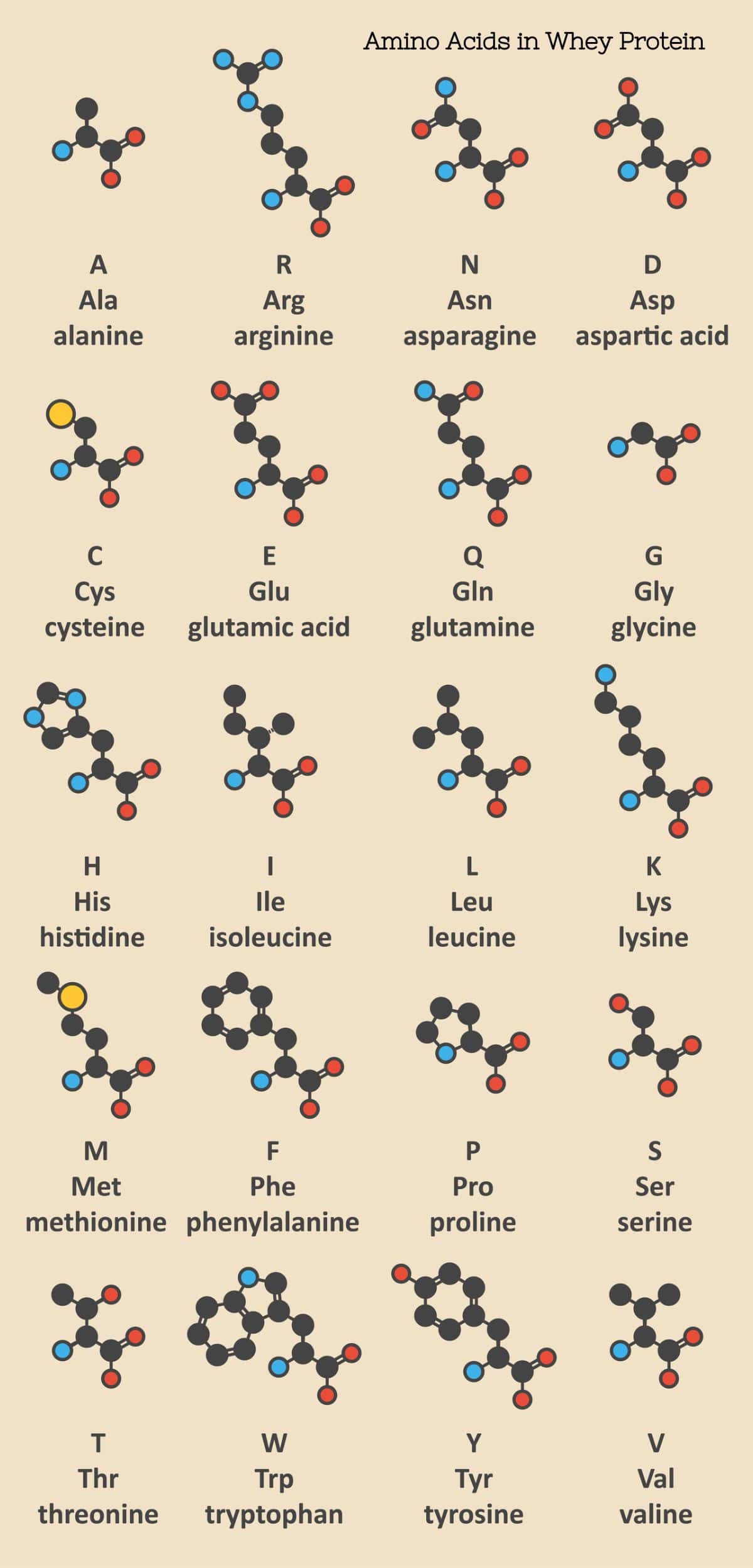
- Leucine: Key for muscle protein synthesis, leucine is essential for building muscle mass and repair, making it a vital component for athletes and bodybuilders.
- Isoleucine: This amino acid aids in muscle metabolism, and recovery, and plays a significant role in immune function and energy regulation.
- Valine: It stimulates muscle growth and regeneration and is involved in energy production, crucial for maintaining the strength and endurance of muscle fibers.
- Lysine: Important in protein synthesis, lysine also contributes to hormone and enzyme production and is essential for calcium absorption.
- Threonine: Supports collagen, elastin, and muscle tissue structure, and is vital for fat metabolism and immune function.
- Tryptophan: Known for influencing mood, sleep, and appetite through its role in serotonin production.
- Methionine: Assists in metabolism and detoxification, and is necessary for tissue growth and the absorption of essential minerals like zinc and selenium.
- Phenylalanine: Plays a key role in the structure and function of proteins and enzymes and is instrumental in producing other amino acids.
- Histidine: Essential for producing histamine, histidine is vital for immune response, digestion, sexual function, and regulating sleep-wake cycles.
Together, these amino acids make whey protein a highly effective supplement for not only muscle growth and recovery but also for supporting various bodily functions including metabolic processes and immune health.
Their combined action ensures that whey protein is a comprehensive source of nutrition, beneficial for a wide range of dietary and fitness goals.
Comparative Analysis: BCAAs and Whey Protein
In the ever-evolving world of nutrition and fitness, the debate between BCAAs and Whey Protein remains a hot topic.
Understanding their chemical structure, nutritional profile, and specific applications can help unravel which is the best choice for your needs.
Chemical Structure and Nutritional Profile
BCAA stands for Branched Chain Amino Acid. They consist of leucine, isoleucine, and valine, which are crucial for muscle protein synthesis.
However, they are considered incomplete proteins as they lack other essential amino acids.
In contrast, whey protein is a complete protein containing all essential amino acids, offering not just quantity but a variety of different amino acids, crucial for overall nutrition.
Muscle Recovery vs Daily Protein Intake
When it comes to muscle recovery, BCAAs are often preferred due to their direct impact on muscle cells, making them particularly beneficial for endurance athletes or those engaged in high-intensity training.

They play a significant role in reducing muscle protein breakdown and maintaining energy levels during prolonged activities.
On the other hand, whey protein, with its comprehensive profile of essential amino acids, is more suited for meeting daily protein needs.
It supports muscle repair and overall bodily functions, making it a better option for the average person looking to supplement their diet with enough protein.
Scenarios and Preferences
For endurance athletes, BCAAs are a popular choice due to their targeted muscle support, especially in terms of recovery and reducing muscle soreness. It also has a lower caloric content than whey protein. Because of this, it is often
In contrast, whey protein, with its ability to satiate, is also often chosen by individuals focused on weight management or loss. For those aiming to build muscle mass, whey protein's complete nutritional profile, supplying all necessary amino acids for new muscle tissue growth, makes it the preferred option.
Accessibility and Effectiveness
Whey protein, typically in powder form, is versatile and can easily be incorporated into various diets and recipes, providing much-needed grams of protein with minimal effort.
BCAAs, while more specific in their action, are invaluable for those needing targeted support, particularly for muscle recovery post-exercise.
In recent years, there has been much information about the benefits of both BCAAs and whey protein. For achieving better results, understanding your primary goals – whether it's boosting energy, recovering from intense workouts, or ensuring adequate daily protein intake – is crucial.
Each of these supplements offers unique benefits, and choosing the best way to incorporate them into your regimen depends on your individual needs and fitness aspirations.
Considerations for Quality and Purity
When selecting supplements, whether BCAAs or whey protein, the importance of clean ingredients cannot be overstated.
The purity of these supplements directly impacts their effectiveness and the overall health benefits they offer.
Clean Ingredients are Key
High-quality supplements prioritize natural, clean ingredients. These products are more likely to be free from harmful additives that can negate the positive effects of the supplement.
Clean ingredients ensure that your body receives the nutrients it needs without the risk of ingesting harmful substances.
Additives to Avoid
Be wary of supplements containing preservatives, artificial flavors, colors, and sweeteners.
These additives can cause adverse reactions in some individuals and may detract from the nutritional value of the supplement.
For instance, certain artificial sweeteners are linked to digestive issues, and cancer, and may affect blood sugar levels.
Tips for Reading Labels

- Ingredient List: Look for a short list of recognizable ingredients. The fewer the ingredients, the less likely the product contains unnecessary fillers or additives.
- Certifications: Look for certifications like NSF or Informed-Choice, which indicate that the product has been tested for quality and purity.
- Allergen Information: Check for allergens or ingredients you may be sensitive to. This is crucial for those with dietary restrictions or allergies.
- Third-Party Testing: Products that have undergone third-party testing offer an additional layer of assurance regarding their quality and purity.
Whole Foods vs Supplements
While supplements are an effective way to increase protein and amino acid intake, they should not replace whole foods in your diet. Whole foods provide a complex nutritional profile that supplements cannot fully replicate.
The Role of Whole Foods
Whole foods offer not just protein and amino acids but also a wide range of vitamins, minerals, and other nutrients essential for overall health.

Foods like lean meats, dairy, legumes, nuts, and seeds are rich in protein and provide the body with a balanced nutrient profile.
When to Choose Supplements
Supplements are ideal in certain scenarios:
- Dietary Restrictions: Individuals with dietary restrictions may find it challenging to consume enough protein through food alone.
- Convenience: Supplements offer a quick and convenient way to ingest protein, especially for those with a busy lifestyle.
- Specific Nutritional Needs: Athletes or those undergoing intense physical training may require a higher protein intake than what their regular diet provides.
In conclusion, while supplements are a valuable tool for meeting specific nutritional needs, they are most effective when used in conjunction with a balanced diet rich in whole foods.
Understanding when and how to use supplements can help you make informed choices about your nutrition and health.
Our Favorite Brands of BCAAs and Whey Protein
In the quest for the best supplements, it's crucial to find brands that align with our values of clean, natural ingredients.
Here are our top picks for BCAAs and Whey Protein, which have made a significant impact on our health routine.
BCAAs Picks
- Naked Nutrition BCAAs: This brand stands out for its commitment to minimal ingredients, ensuring you get exactly what you need without any unnecessary fillers. Its natural sourcing approach aligns perfectly with a holistic lifestyle.
- Pure Encapsulations BCAA: Known for its high-quality, pure ingredients, this brand offers a straightforward, no-nonsense BCAA supplement. It's a great choice for those looking for a pure, unadulterated product.
- Clean BCAA: True to its name, Clean BCAA promotes natural sourcing and avoids artificial ingredients. It’s an excellent option for those who are mindful about what goes into their supplements.
Whey Protein Favorites
- Raw Organic Whey: This brand takes pride in its organic sourcing, ensuring that you're getting whey protein in its most natural form.
- Natural Force Grass-Fed Organic Whey: For those who prefer grass-fed products, this whey protein is a fantastic choice. It combines the benefits of organic sourcing with the nutritional superiority of grass-fed protein.
- Truvani (non-whey Plant-Based Option): For a plant-based alternative, Truvani's products are top-notch. They offer high-quality, plant-based protein powders that are a great fit for those on a plant-based diet or with dairy sensitivities.
Personal Favorites
- Naked Nutrition Protein Powder: This has become a family favorite, particularly with our kids. It tastes like a milkshake, making it a delightful treat that's also packed with nutrition.
- Truvani Protein Powder: I personally love adding Truvani protein powder to my morning smoothies. It blends seamlessly and offers a great nutritional boost to start the day.
These brands have been carefully selected for their quality, purity, and alignment with natural, healthy living.
Whether it's for muscle building, recovery, or simply a nutritional supplement, these options are excellent choices for anyone looking to enhance their health regimen with clean, effective products.
FAQ
The answer to whether BCAA is better than whey protein depends on your specific health and fitness goals. BCAAs are primarily beneficial for muscle recovery and reducing muscle soreness after intense workouts.
They are also useful for maintaining muscle mass during periods of reduced calorie intake.
Whey protein, on the other hand, is a complete protein source that aids in overall muscle growth, recovery, and maintenance.
It's also beneficial for general health due to its comprehensive profile of essential amino acids. Therefore, the choice between BCAA and whey protein should be based on your individual nutritional needs and fitness objectives.
Whey protein already contains BCAAs as part of its amino acid profile. If your diet includes whey protein, you are likely already receiving a sufficient amount of BCAAs for normal muscle recovery and growth.
However, additional BCAA supplementation might be beneficial in specific scenarios, such as for athletes engaging in intense training or for those looking to reduce muscle breakdown while fasting or on a calorie-deficit diet.
One potential downside of BCAA supplements is that they only contain three essential amino acids (leucine, isoleucine, and valine) and do not provide the full spectrum of essential amino acids needed for complete nutrition.
This means they are not a replacement for complete protein sources. Over-reliance on BCAAs can lead to an imbalance in amino acid intake.
Additionally, some BCAA supplements may contain additives or sweeteners that aren’t aligned with clean eating principles.
BCAAs are beneficial for muscle recovery and can help preserve muscle mass, but they are not as effective as complete protein sources like whey protein for muscle growth.
BCAAs can stimulate muscle protein synthesis, especially after workouts, but the body requires all essential amino acids for sustained muscle growth.
Therefore, while BCAAs are helpful, they are generally considered a supplement to, rather than a replacement for, complete protein sources in the context of muscle growth.
Final Thoughts
As we conclude this comprehensive guide on BCAAs vs Whey Protein, it’s essential to reflect on the key takeaways and how they can be applied to enhance your wellness journey. Remember, whether you choose BCAAs or whey protein, the focus should always be on quality, purity, and how well the product aligns with your individual health needs and fitness goals.
Emphasize Quality and Natural Sources
Select supplements that prioritize natural, clean ingredients and minimal additives. This ensures that you’re not only supporting your body’s nutritional needs but also adhering to a holistic approach to health.
Whole Foods vs Supplements
While supplements are a valuable addition to your diet, they should complement, not replace, the nutrients you obtain from whole foods. A balanced diet rich in natural, whole foods is fundamental for overall health and well-being.
We Value Your Experiences
We'd love to hear about your experiences with BCAAs and whey protein. Your insights and personal stories can be incredibly helpful to others navigating these choices. Feel free to share your thoughts and experiences in the comments section.
Continue Your Health Journey
For more insights on leading a healthy lifestyle, check out our other articles:
- The Benefits of a Processed-Free Diet: Discover how eliminating processed foods can significantly enhance your health.
- The Power of Clean Eating: Learn about the many benefits that come with a clean eating approach.
- Gut Health Essentials: Understand how to ensure your body efficiently absorbs all the high-quality nutrients you feed it.
Stay Connected
Don’t forget to share this article on social media and subscribe to our newsletter for more valuable content on healthy living. By staying connected, you can keep up-to-date with the latest trends, tips, and advice in the world of holistic nutrition and wellness.
Be well,
Natalie

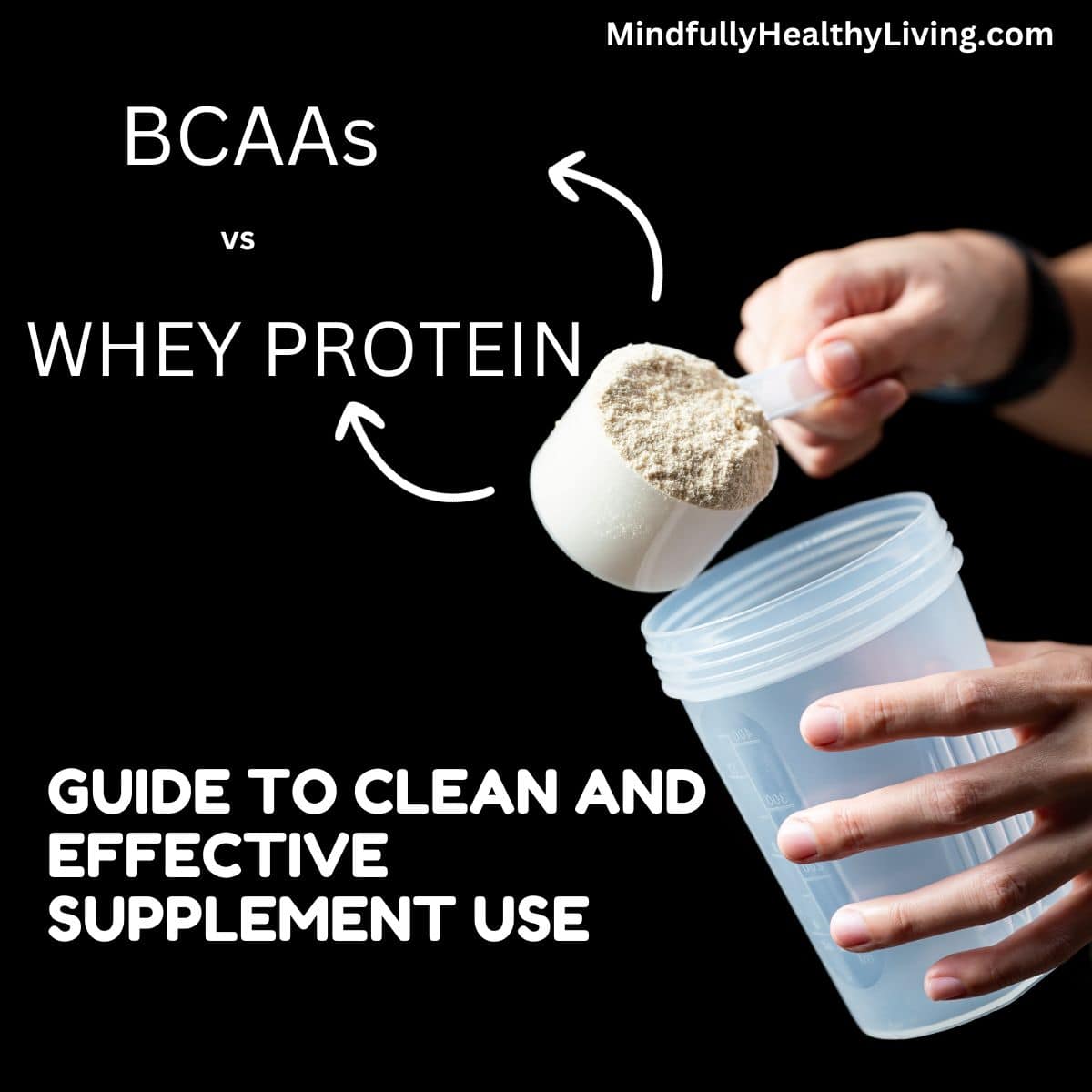



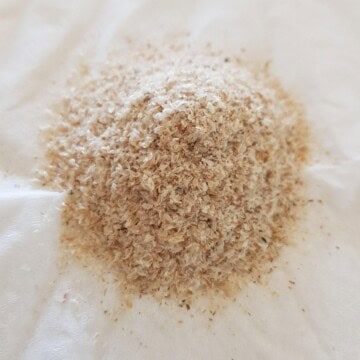
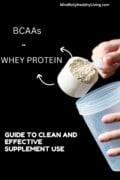
Century Foods says
Thanks for sharing this very well-written and worth-reading article.
Wish to see more in the coming days.
Natalie Perry says
Thank you so much!